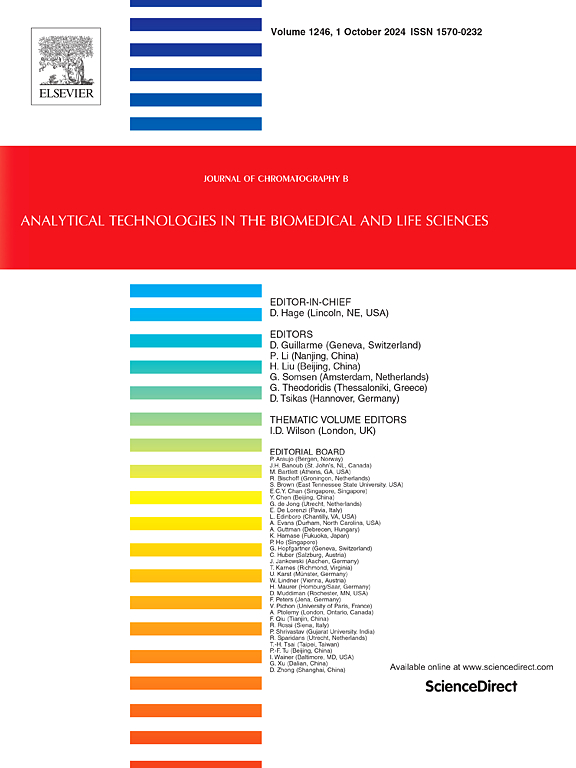Application of 1-octanol in the extraction and GC-FID analysis of volatile organic compounds produced in biogas and biohydrogen processes
IF 2.8
3区 医学
Q2 BIOCHEMICAL RESEARCH METHODS
引用次数: 0
Abstract
Information about the volatile organic compounds generated in biogas and hydrogen production bioreactors is essential to elucidate the metabolic routes and varying yields of CH4 and H2 processes. In this work, the determination of 12 compounds (acetone, methanol, ethanol, 1-propanol, 1-butanol, and acetic, propanoic, butyric, isovaleric, valeric, caproic, and lactic acids) was performed by gas chromatography, after a vortex-assisted liquid–liquid microextraction (VALLME) procedure using 1.2 mL of crude sample and 400 µL of 1-octanol. Optimization of the separation process was performed, considering the solvent viscosity. The analytical curves were validated using ANOVA, demonstrating satisfactory precision and accuracy. Selectivity was confirmed by GC–MS analysis, which allowed the detection of glycerol, 1,3-propanediol, and 1,3-butanediol in some samples. Methanol levels exceeded the upper limit of quantification, with acetic acid and ethanol being the predominant compounds in the analyzed reactors. An additional investigation was conducted to assess potential interferences for lactic acid. The developed method employs a biodegradable extraction solvent, without any need for a dispersing solvent, and involves a single chromatographic run, without any derivatization steps.
应用 1-辛醇萃取和 GC-FID 分析沼气和生物制氢过程中产生的挥发性有机化合物。
有关沼气和制氢生物反应器中产生的挥发性有机化合物的信息对于阐明 CH4 和 H2 过程的代谢途径和不同产量至关重要。在这项工作中,使用 1.2 mL 粗样品和 400 µL 1-辛醇,通过涡旋辅助液液微萃取 (VALLME) 程序,采用气相色谱法测定了 12 种化合物(丙酮、甲醇、乙醇、1-丙醇、1-丁醇以及乙酸、丙酸、丁酸、异戊酸、戊酸、己酸和乳酸)。考虑到溶剂的粘度,对分离过程进行了优化。利用方差分析对分析曲线进行了验证,结果表明精确度和准确度令人满意。气相色谱-质谱分析确认了选择性,在某些样品中可以检测到甘油、1,3-丙二醇和 1,3-丁二醇。甲醇含量超过了定量上限,乙酸和乙醇是分析反应器中的主要化合物。另外还进行了一项调查,以评估乳酸的潜在干扰。所开发的方法采用可生物降解的萃取溶剂,无需分散溶剂,只需一次色谱运行,无需任何衍生步骤。
本文章由计算机程序翻译,如有差异,请以英文原文为准。
求助全文
约1分钟内获得全文
求助全文
来源期刊

Journal of Chromatography B
医学-分析化学
CiteScore
5.60
自引率
3.30%
发文量
306
审稿时长
44 days
期刊介绍:
The Journal of Chromatography B publishes papers on developments in separation science relevant to biology and biomedical research including both fundamental advances and applications. Analytical techniques which may be considered include the various facets of chromatography, electrophoresis and related methods, affinity and immunoaffinity-based methodologies, hyphenated and other multi-dimensional techniques, and microanalytical approaches. The journal also considers articles reporting developments in sample preparation, detection techniques including mass spectrometry, and data handling and analysis.
Developments related to preparative separations for the isolation and purification of components of biological systems may be published, including chromatographic and electrophoretic methods, affinity separations, field flow fractionation and other preparative approaches.
Applications to the analysis of biological systems and samples will be considered when the analytical science contains a significant element of novelty, e.g. a new approach to the separation of a compound, novel combination of analytical techniques, or significantly improved analytical performance.
 求助内容:
求助内容: 应助结果提醒方式:
应助结果提醒方式:


